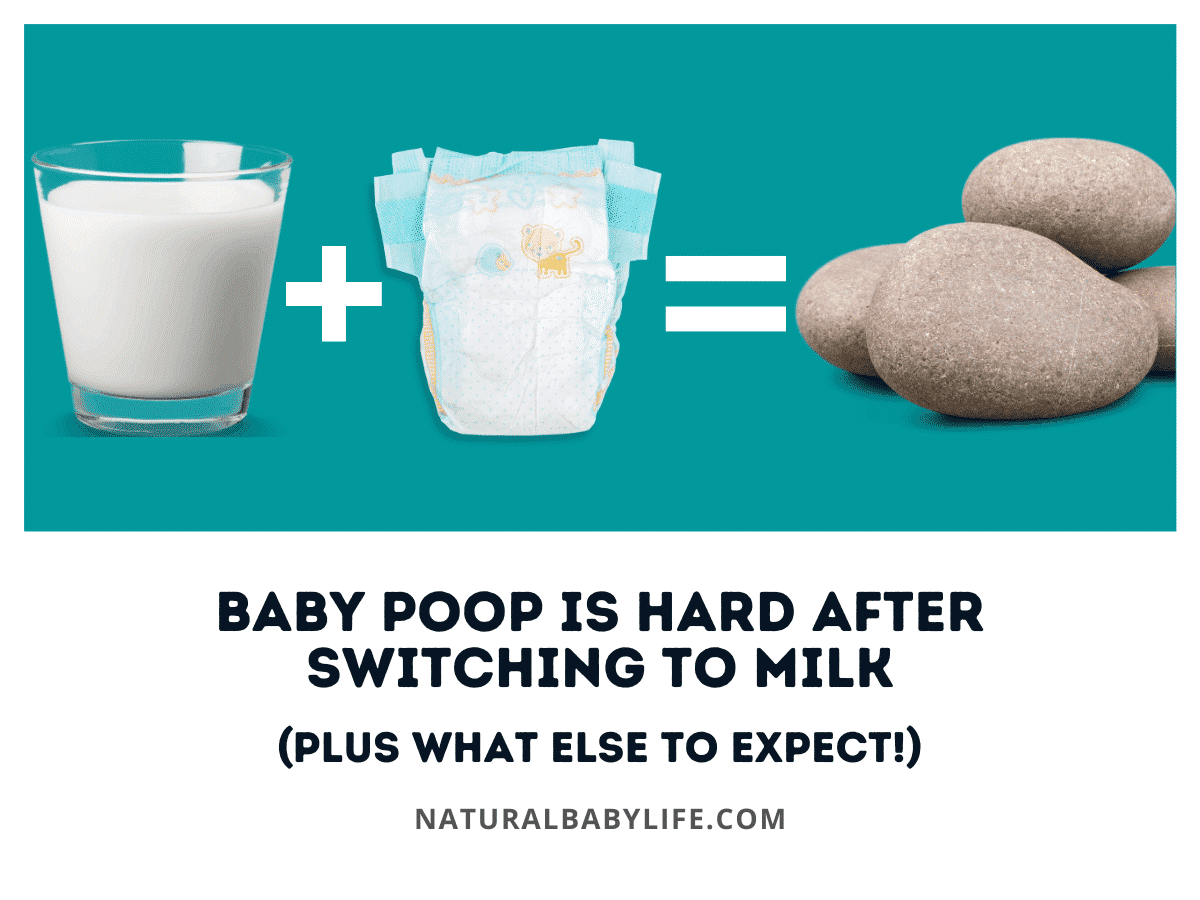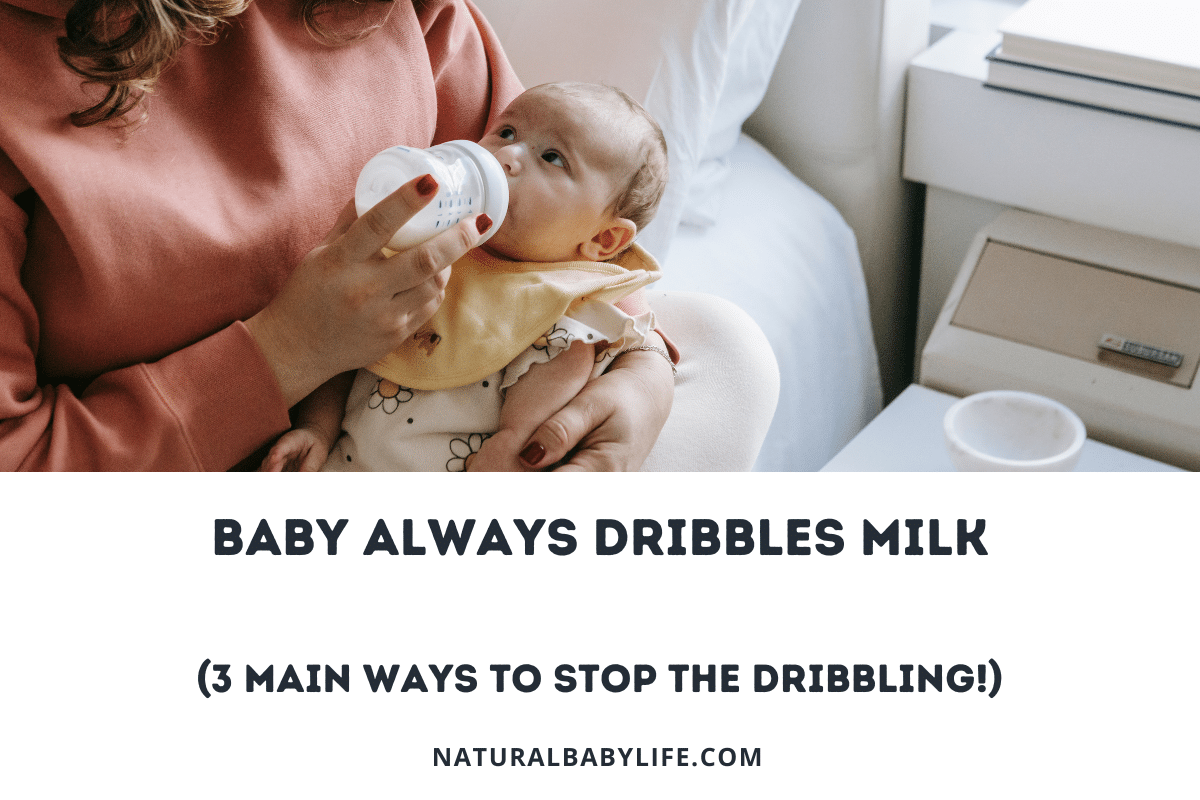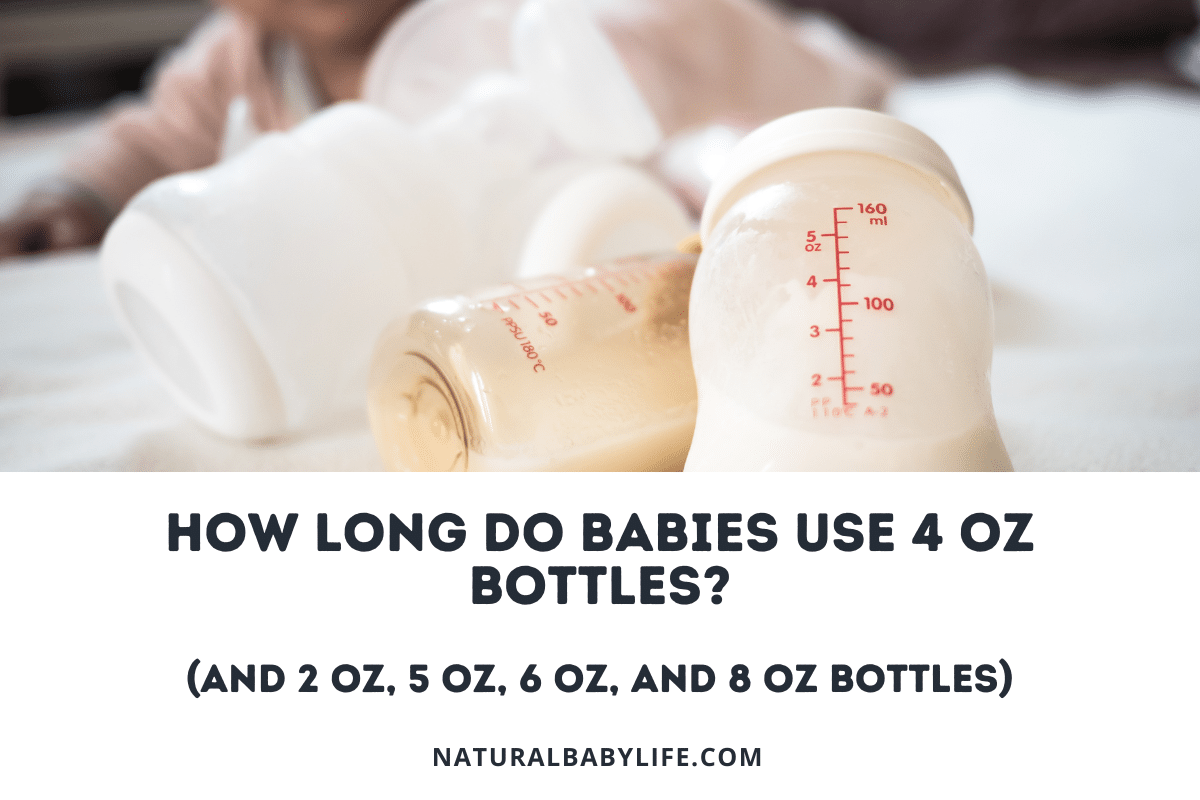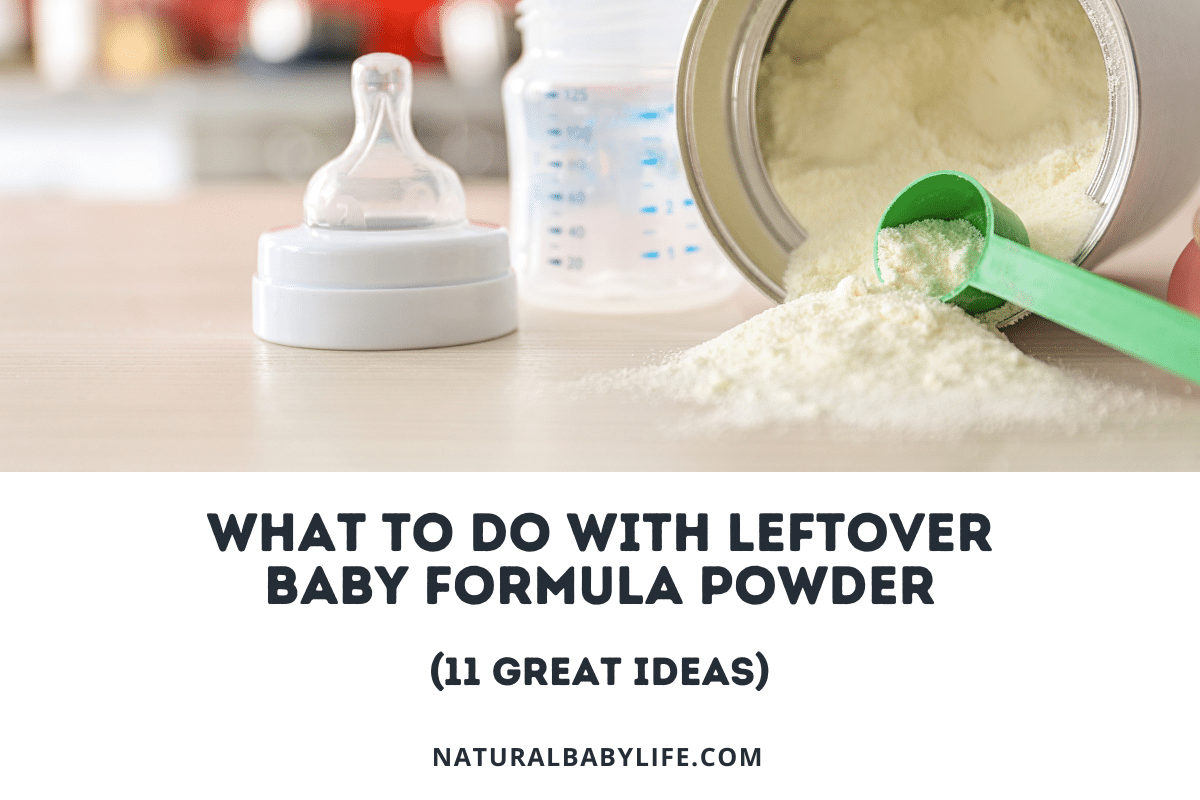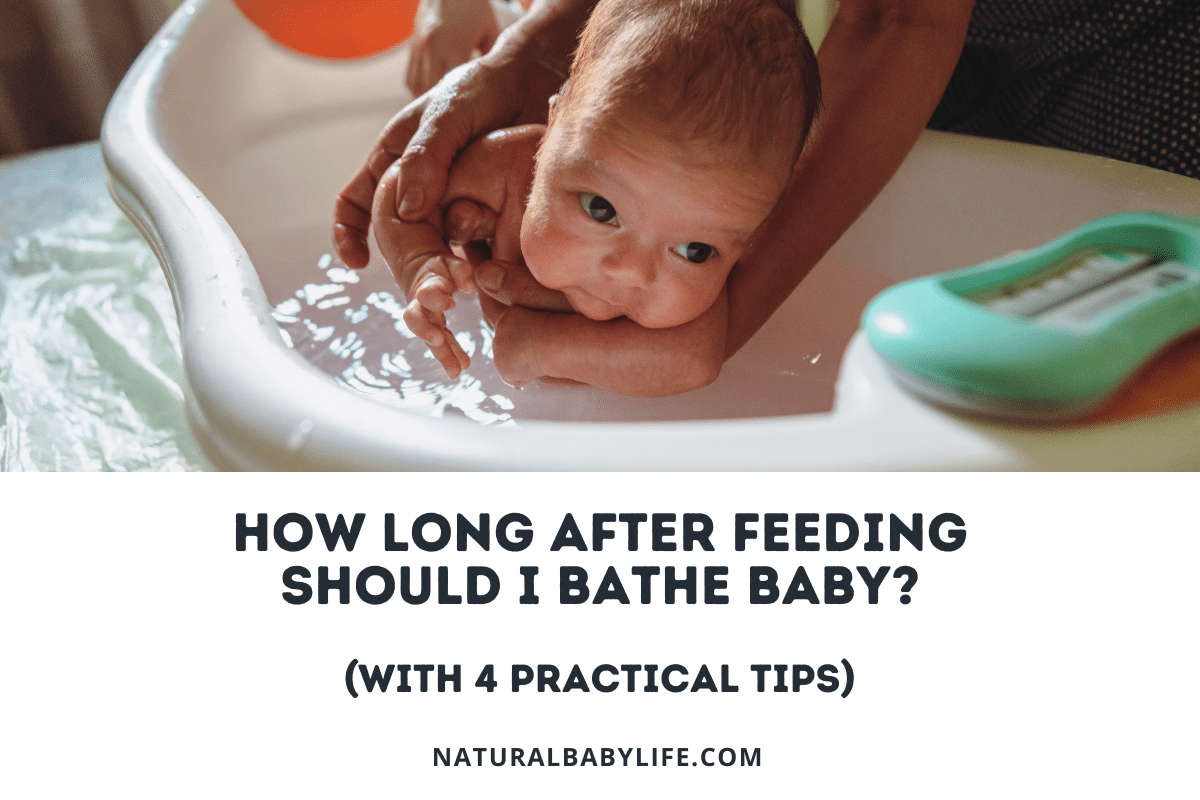Changing our baby’s diapers is a big part of our responsibilities as parents and, if we’re honest, is often our least favorite job. But even worse than changing yet another poopy diaper, is the concern and worry parents feel after they leave breastmilk or formula behind and we notice that their diapers suddenly contain hard poop. Is it normal for our baby’s poop to be so hard after we transition them to whole milk?
It is common to find that your baby’s poop is harder than usual after they make the switch to cow milk from breastmilk or formula. This mild constipation is due to their digestive tract adapting to the higher amount of protein compared to what they are used to. However, if it is accompanied by a fever or other symptoms is a cause for concern.
Keep reading for more information about why your baby’s poop changes when transitioning to whole milk and why it may have become hard after switching to milk from breastmilk or formula. We’ll also cover what other changes you might notice in the color and consistency of their poop. Plus, answers to your questions about what you can do to help ease the transition for your baby, and how to know if the changes you are noticing require a trip to the pediatrician.
Table of Contents
How poop changes when transitioning to whole milk
According to the American Academy of Family Physicians, you should wait to introduce whole cow’s milk until your baby is at least twelve months old. But what should you do when you introduce your one-year-old baby to milk and notice that your baby’s poop is hard after switching to milk?
The contents of your baby’s diaper may be perfectly normal, just different from what you are used to seeing there. If you breastfed your baby before changing to whole milk, you are probably used to your baby’s poops being runny and green, brown, or mustard yellow in color and looking seedy in texture. If your baby was formula-fed, you are likely used to changing more frequent poops that are yellow, light brown, or orange in color with a consistency similar to peanut butter. Transitioning your baby from breast milk or formula to whole milk can result in changes to the color, size, and consistency of your baby’s poop.
Cow’s milk has higher levels of fat, minerals, and protein as compared to breast milk, which is easier for your baby to digest. Also, formula is often made with processed skim milk which contains less fat and protein than whole milk. When a baby first starts drinking whole milk, their poop may look hard, pale, and tan in color as their bodies adjust to the change of proteins in the milk.
Can switching to whole milk cause hard stools or constipation?
Hard poop is common and normal after switching your baby to whole milk from breast milk and formula.
That hard poop you found in your baby’s diaper is likely a sign of milk protein intolerance constipation, as their digestive system is adjusting to breaking down the proteins in cow’s milk.
However, extremely firm, pebble-like stools could be a sign of dehydration and extreme constipation and require a trip to your baby’s doctor.
Can babies get diarrhea when switching to whole milk?
If you have just added whole cow’s milk to your baby’s diet, a mild and short-lived case of diarrhea may be a sign of their body adjusting to the changes of more protein in their digestive system and is not normally a cause to be overly concerned.
But if you are changing blow-out diarrhea diapers frequently after introducing milk to your baby’s diet, that is not normal or healthy for your baby and you should contact your pediatrician.
It is possible that your baby has a milk allergy, which is rare, or a virus or illness unrelated to the milk, especially if they are running a fever or show other signs and symptoms of illness.
White or yellow poop after switching baby to whole milk
As parents, we spent a shocking amount of time examining our little one’s poop frequency, consistency, and color.
White poop is uncommon in babies and warrants a trip to the pediatrician, but there are a variety of conditions ranging from normal to severe that could cause your baby’s stool to be yellow in color.
If your baby has chalky white poop, it may indicate a lack of bile in your baby’s liver. White poop can be a sign that your baby is not properly digesting their food which is cause for alarm.
Yellow baby poop can be perfectly normal and healthy if you are still breastfeeding your baby or giving them formula. However, if your baby is pooping frequently and the poop is yellow, very runny, or contains mucus, your baby should be seen by a doctor. Bright yellow poop is also not a normal color for poop and can be caused by serious illness, it too should be evaluated by a doctor. Another possible cause of yellow poop is an intestinal infection which will require a trip to the doctor for a diagnosis. If your baby has an intestinal infection you would likely see other signs of illness, such as abdominal pain and diarrhea.
Baby poop color change after whole milk change
There are a wide array of colors that can be normal and healthy when it comes to your baby’s poop after introducing whole milk, and the color of your baby’s poop can vary temporarily.
After making the change to whole milk, your baby’s poop may look pale and tan in color. If you have also recently introduced your baby to some new solid food, the presence of undigested food can cause color changes in your baby’s poop.
Healthy baby poop can be various shades of yellow, orange, brown, or green.
Undigested milk in baby stool
If your baby is not digesting milk properly, your baby will likely have watery diarrhea after consuming milk.
Introducing your baby to whole milk for the first time also means they are consuming a different amount of lactose than they are used to. If your baby cannot digest lactose, you may also notice other signs of intolerance, such as gas, bloating, and an upset stomach.
An intolerance to lactose is not the only cause of diarrhea and you should seek an evaluation by a doctor if it continues.
What does baby poop look like with a milk allergy?
The signs and symptoms of a milk allergy can range anywhere from extremely severe to mild and should be evaluated by a doctor.
If your baby has a milk allergy, he or she may have either black or red diarrhea caused by inflammation in your baby’s gut from the milk. If the poop is red and bloody, the inflammation is likely in the lower part of your baby’s gut. If it is black, it is likely from the higher part.
Signs and symptoms of a milk allergy include:
- Vomiting
- Wheezing
- Hives
- Itching around the mouth
- Swelling of your baby’s lips, tongue, and/or throat
- Coughing
- Shortness of breath
- Diarrhea
- Watery eyes & nose
- Colic
If you notice symptoms of severe allergic reaction immediately after introducing your baby to cow’s milk, you should call an ambulance or take your baby to the hospital immediately.
How to help baby transition to milk
There are several things that we parents can do to help ease the transition to milk for our babies.
Here are some ways to help your baby transition to milk:
- Wait until your baby’s first birthday.
- Take it slowly, when you do – you can mix whole milk with equal parts breastmilk or formula and then gradually increase the ratio of whole milk to breastmilk or formula.
- Give milk as a beverage, not as a meal.
- Serve the milk warm, similar to how you would give them a bottle (or the temperature of fresh breastmilk).
Baby is fussy after switching to milk
Babies are fussy by nature.
After switching them to milk, it is common for babies to have to strain a little when pooping, and you may see them scrunch up their little faces in frustration when making the effort.
Excessive fussiness and frequent crying after switching to milk are not normal. Talk to your baby’s doctor about your baby starting milk and rule out other possible causes.
How long does it take for a baby to adjust to whole milk?
There is no one timetable for how long a baby may take to adjust to drinking milk. Plan on giving your baby time to adjust to the change.
How long it takes can vary depending on the amount they drink, how often, and how well your baby’s body is responding to it.
As long as you are following the recommendations of your baby’s pediatrician, and keeping a lookout for any symptoms of possible illness or allergy when making the switch, your baby is likely healthy and benefiting from the addition of milk to their diet.

